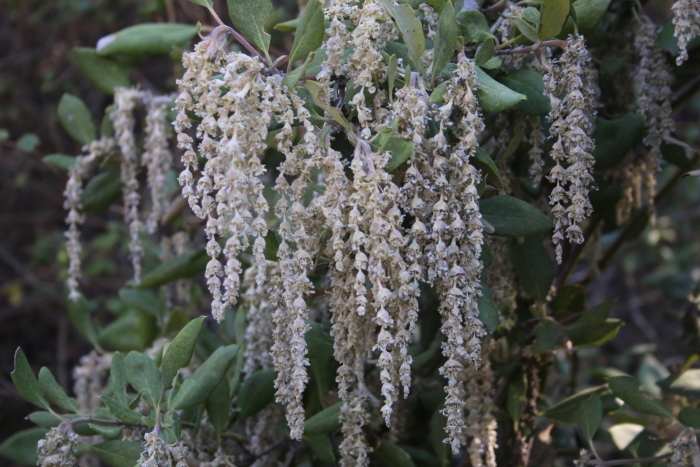Ashy Silktassel
(Garrya flavescens)
Ashy Silktassel (Garrya flavescens)
/
/

Joe Decruyenaere
CC BY-SA 2.0
Image By:
Joe Decruyenaere
Recorded By:
Copyright:
CC BY-SA 2.0
Copyright Notice:
Photo by: Joe Decruyenaere | License Type: CC BY-SA 2.0 | License URL: https://creativecommons.org/licenses/by/2.0/ | Uploader: joedecruyenaere | Publisher: Flickr |























































Estimated Native Range
Summary
Garrya flavescens, commonly known as Ashy Silktassel, is an evergreen shrub native to the chaparral and mixed evergreen forests of the Southwestern USA, California, and Baja California. It typically grows to a height of up to 3 meters (10 feet) with a similar spread. The plant’s form is upright with dense, leathery foliage. Leaves are oval-shaped, 7 to 8 centimeters long, and about half as wide, with the underside ranging from hairless to very hairy and a distinctive pale dusty gray color. Ashy Silktassel is dioecious, meaning individual plants are either male or female. Both sexes produce long, hanging clusters of flowers, with the male flowers being particularly showy due to their longer catkins. Female plants bear spherical berries covered in hairs after flowering. The plant blooms in winter and spring, producing green and silver flowers that add interest during a season when few other plants flower.
Ashy Silktassel is valued for its drought tolerance, making it suitable for xeriscaping and low-water gardens. It is also appreciated for its winter and spring flowers, which provide visual interest when few other plants are in bloom. This shrub is often used in naturalistic plantings, as a screen or hedge, and in coastal gardens due to its tolerance of salt spray. It thrives in full sun to part shade and prefers well-drained soils. While generally low-maintenance, it can suffer from root rot in poorly drained soils and may be affected by scale insects and fungal diseases.CC BY-SA 4.0
Ashy Silktassel is valued for its drought tolerance, making it suitable for xeriscaping and low-water gardens. It is also appreciated for its winter and spring flowers, which provide visual interest when few other plants are in bloom. This shrub is often used in naturalistic plantings, as a screen or hedge, and in coastal gardens due to its tolerance of salt spray. It thrives in full sun to part shade and prefers well-drained soils. While generally low-maintenance, it can suffer from root rot in poorly drained soils and may be affected by scale insects and fungal diseases.CC BY-SA 4.0
Plant Description
- Plant Type: Shrub
- Height: 6-9 feet
- Width: 3-6 feet
- Growth Rate: Moderate
- Flower Color: Green, White
- Flowering Season: Winter, Spring
- Leaf Retention: Evergreen
Growth Requirements
- Sun: Full Sun, Part Shade
- Water: Low, Medium
- Drainage: Medium
Common Uses
Bee Garden, Bird Garden, Butterfly Garden, Low Maintenance
Natural Habitat
native to the chaparral and mixed evergreen forests of the Southwestern USA, California, and Baja California
Other Names
Common Names:
Scientific Names: , Garrya flavescens, Garrya flavescens subsp. pallida, Garrya flavescens var. pallida, Garrya flavescens subsp. flavescens, Garrya flavescens var. flavescens, Garrya mollis, Garrya pallida, Garrya veatchii var. flavescens,
GBIF Accepted Name: Garrya flavescens S.Watson